
Two young heterosexuals, a kiss that has the power to change lives and a rooftop
When we try to answer the question "what is the reason to love?", we will always be surprised to realize that there really is no reason at all. Through images, music, words and silences, 'Heart... Not a Reason', the 2020 Thai short film, describes this situation, while immersing us in the passionate and secret love relationship between two young heterosexuals, who fall in love after kissing as part of a card game in which they participate.Toey and Puth, which is the name of our narrative heroes, are two strangers who meet for the first time after their respective girlfriends, May and Ploy, meet again after some time, and decide to introduce their current partners and go on dates double.
During the course of the evening, between plates of food and drinks of alcohol, the four young people agree to participate in a card game, in which the losers must comply with the punishment imposed by the winner.
With the chemical universe behind a kiss, Toey, played by Scott Pannachai Keatkaew, an actor we know for his role as Pent in the LGBT+ themed romantic series 'What the Duck' and 'What the Duck Season 2: Final Call ', and Puth, played by Book Sikaphat, an actor and singer known for appearing in the drama 'Risk Lust Love', also experienced a very deep exchange of sensations and emotions that gave way to love. In other words: knowing each other allowed them to know themselves.
The character played by Scott conveys the image of a person with a confused heart and no confidence. In truth, Toey searches for true love, and what he has searched for so long he finally finds in Puth. He likes how Puth cares about him, pays attention to him, with specific actions such as preparing dinner for him or surprising him on his birthday with a cake. And all this causes Toey to fall in love with him even more.
For his part, Puth is one of the people who gives himself over to love completely. He can't help but fall in love with Toey. While your brain asks you to get away from him, your heart takes you once again to meet him. Puth doesn't want to hurt Ploy, and that's why he hesitates whether or not to continue his secret relationship with Toey, but he can't resist the feeling that has arisen in the center of his chest. It will be very difficult for you to end the relationship with the person you love. While your mouth says one thing, your feelings say the opposite.
However, Puth's girlfriend has also fallen in love with her friend's boyfriend.
Both actors well convey anxiety, restlessness, nervousness, euphoria... all those common and frequent symptoms in people who feel in love. While I see the characters looking at their cell phones, confident that the message is from the other, or how, shyly, they avoid each other's gaze when they meet in public at the shopping center or at the door of one of their houses, I seem to see fluttering the famous butterflies in the stomach, feeling the sweat soak their hands or listening to the beating of their hearts.
The rooftop scene is memorable, as both characters are able to express their feelings and show the incredible chemistry between the two.
The viewer will be able to see how the power of an unexpected and involuntary kiss provokes in the two young people not only that desire to kiss that has a scientific name: filemamania.
The story will surprise us by discovering that nothing is what it seems: while one thinks that they have just started a flirtation, that they feel nervous being close to each other, suddenly we will understand that between the two there is already a deep loving relationship and both they have reached the point where they debate whether it would be right to continue the romance or break up.
The good production, beautiful images, delicate editing, structured script, and a credible well-told story would only be missing a tender and melancholic song. And we have that too, because the short film, in addition to provoking reflection on how no one should be blamed when you fall in love, since no one can control your feelings and your heart, seeks to convey the real story that happened and allowed Book Sikaphat to compose the song "Hua Jai", from the Sikpat Book, which tells the story of two friends who fall in love and how the feeling that arises between them causes the change of their friendly relationship into a romantic one.

The classic relationship: one of the members of the couple dominates and the other is dominated
Produced by Lu Po Wen and Li Yun Ming, the director and producer of the three parts of 'Ghost Boyfriend', 'River Knows Fish Heart' revolves around the romance of two high school students Situ Xiao Yu (Chinese name that translates such as "Little Fish"), a rich young man who runs away from home and pursues his dream of being a musician, and An He (literally "River"), a musical genius who is experiencing composer's block.Written and directed by Lv Bowen, the romantic, musical and youth drama with an LGBT+ theme addresses topics such as campus life, coexistence, coming of age, obsession and the power difference in a relationship in which one of one member of the couple dominates and the other is dominated.
The two enthusiastic music lovers with parental problems, played by Zhen Jia Jian and Meng Yue Chen, respectively, decide to live together after meeting at the school to which Xiao Yu has transferred after leaving his parents' home.
As they organize their lives to participate in the musical competition, a subtle and elusive feeling arises between the two of them. However, the day before the event, Xiao Yu disappears, leaving An He in an embarrassing situation, not knowing how to deal with this situation.
Despite their different personalities, between the athletic Xiao Yu with a cold smile, mysterious eyes and bad boy vibe, and the bright student with a tender, innocent and childish look An He, love arises. When Xiao Yu sees their relationship threatened, he explains his actions as follows: "I'm just a little fish in the river. It's just my human nature to protect my habitat from being invaded."
Needing to move after disagreements with his father, Xiao Yi enters the house and, above all, An He's life. Soon the visitor will leave the living room couch and take up space on the shy teenager's bed, despite the fact that he repeatedly rejects his seductive but dominant roommate.
Using old school kinky and problematic tropes such as dominant boy and dominated boy, 'River Knows Fish Heart' touches on themes of communication, consent and self-acceptance.
The film enters 'Addicted' territory, only this time with the muscular, seme athlete who falls madly in love with the tender, nerdy uke and decides to take charge of his life and protect him even from his mother, who has never heard his son sing or play. the piano or the guitar.
The character of Zheng Jia Jian is not innocent at all: with his 185 centimeters of height, an athletic and slightly bossy body, on the other hand he has plenty of inspiring vibes that find resonance in a contemporary youth who feels identified by making them dream. Furthermore, his dominant traits and the way he penetrates An He's life until he breaks him really makes the viewer want to be in the position of the dominated boy.
Lovers of the genre will enjoy the most daring scene in 'River Knows Fish Heart', in which we can see how Xiao Yu forces his roommate to kiss him in the bathroom, erotically whispering: "I want to possess every inch of your skin." Even more sensual is that the film offers us scenes of hot kisses and tender and very well-done sexual interactions.
An He's cold, reserved, and even hostile demeanor soon transforms into that of someone warm, sensitive, and friendly. He is a tsundere in all the rules. For his part, the seme Xiao Yu is very aggressive; so the dynamic between the two directly enters another territory, dubcon or "dubious consent", since consent on An He's part is not completely absent, but the situation has certain elements that in real life could be interpreted as a rape.
The relationship between An He and Xiao Yu is the classic blouse and pants combination. Or put another way, it exposes the nature of 'yin and yang' style. When the two energies complement and balance each other is when they achieve a harmonious and happy relationship.
In order to bring to life this cliché story of a bad boy who overpowers the innocent high school student, the director summons two idols admired by the younger generation in China: Meng Yue Chen and Zhen Jia Jian.
Both actors were born to play this type of cute young men who make up the ideal couple for fans who enjoy gay romance.
The first is a musician, Dai dance dancer and actor who in the world of acting became known precisely with this film, but has subsequently participated in the dramas 'Capture Love', 'In Your Heart', the documentary ' Capture Love Special', always playing queer characters, and the film 'Yin Yuan', among other works.
'River Knows Fish Heart' is a film in which Men Yue Chen can, in addition to demonstrating his histrionic qualities, expose his skills as a singer and musician: he plays the acoustic guitar and lets us hear his beautiful and well-pitched voice.
After the premiere of 'River Knows Fish Heart', Meng Yue Chen becomes an Internet phenomenon and is considered by the public to be China's new (gay) girlfriend for his tender look, his fair skin and his beautiful features.
The passionate and moving acting skills of Zhen Jia Jian, who among the youth audience of his country has earned the title of being the personification of attractive and sexy, allows us to remember him for playing Cheng Yue in 'Love Is Not Easy to Have' or Xiao Jie in the drama 'French Love', both with LGBT+ themes.
Audiences will find it difficult to forget two other lines said by his character: "I feel like my dream is not important because I found someone more important than my dream," referring to having left behind his passion for music after finding the love of his life in Little An He, or "This river doesn't need that fish, but without it there isn't much fun."
At the same time, the film also marks the debut of Han Jing Cheng in the role of Wang Zheng. The viewer will remember him for being the protagonist of the films 'Ghost Boyfriend 2' and 'Love Is Not Easy to Have', and the drama series 'Capture Lover', all with LGBT+ themes.
Due to the success of the film, after playing Xiao Yi, Zheng Jia Jian then manages to play another homosexual character in 'Love is not Easy to Have', another famous Chinese film, in which these last two actors will join. Along with Han Jing Cheng, Zheng Jia Jian plays another gay couple with a lot of chemistry and visual beauty that steals sighs from Chinese and international audiences.
According to the director, to represent this story much more clearly, he tried to demonstrate the connection between love and dreams by making the protagonists experience the contradictory mentality of their characters, expecting them to carry out the shyness of teenage romance.

An exploration of the growing drag culture within Taiwan's queer landscape
The 2021 short film 'Best Sisters Forever' revolves around the elegant Xue Rong / "Snow" (Heng-Chi Kuo) and the fun and frivolous A Du / "Cavon" (Soda Voyu), two gay "sisters" best friends, who after having a heated discussion about issues of promiscuity, end up distancing themselves from each other.A tragic event allows the reunion of the two "sisters" a decade later. Knowing that their days together are numbered, the couple embarks on an adventure in hopes of recapturing lost opportunities and creating happy memories. Along the way, they make important discoveries about life, love, friendship, and family. Promises are kept and a long lost dream comes true.
The year after releasing 'Your Name Engraved Herein', a film shortlisted for four awards at the 57th Golden Horse Awards 2020, Liu Kuang Hui (Patrick Liu) offers in 'Best Sisters Forever' an authentic vision of the drag sisterhood in that Asian island.
Associated with GagaOOLala, the Taiwanese director explores the growing drag culture within Taiwan's queer landscape, and reflects on questions of identity, empowerment, bonds and brotherhood within the flamboyant Taiwanese community.
To this end, the film features original performances by some of Taiwan's most famous drag queens at Taipei's most iconic LGBT venue, the historic Red House in Ximending District.
"What has always fascinated me is this special sense of bond or brotherhood that exists between members of the gay community but is rarely talked about or discussed in the mainstream. "So, this is where I wanted to play with this idea of 'sisterhood' and create a story around it specifically in the context of drag," Liu says when premiering the work.
With the intention of visualizing 'drag' and brotherhood within the community, Liu calls on two of the most important actors in the Taiwanese entertainment industry: Heng-Chi Kuo and Soda Voyu.
The first is a singer, director and composer who makes his official screen debut as an actor in this film. In addition to acting, Heng-Chi Kuo performs the main theme of the film: "Don't Rub Salt on the Wound", a song composed in 1999 for A-Mei, the singer considered a gay icon and defender of Taiwanese indigenous and LGBT+ rights throughout the Mandarin-speaking world.
For his part, Soda Voyu is an outstanding actor, winner of the Golden Bell Award, with an extensive filmography, which includes the film 'Tale of the Lost Boys', from 2017, the drama 'Magic Showdown', from that same year, 'iHero 2' and 'Your Name Engraved Herein'.
Thanks to 'Best Friends Forever', both actors play drag characters in a film for the first time, an experience that both together describe as "very entertaining but challenging, a special project that was worth pursuing, especially for its deep cause and the "so necessary drag defense."
Best Sisters Forever is the third installment of GagaOOLala's 2021 anthology 'Queer Up The Volume', a collection of original queer stories, each with their own title track and music video, aiming to portray the different facets of the community. contemporary queer.
The Queer Up The Volume project also includes other titles, such as the second season of GagaOOLala's successful Thai-Taiwanese BL co-production series, 'Call It What You Want 2', by Anusorn Soisa-ngim (Aam); 'Light', from director Adiamond Lee and starring Jed Chung, Max Liu and Ding Ning; the Taiwanese BL drama 'Dark Blue and Moonlight', and 'Fragrance of the First Flower', the lesbian miniseries by director Angel Teng (Bao Bao), winner of the first prize of the GagaOOLala Pitching Sessions 2020.
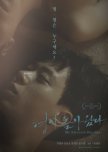
Excellent family psychological drama
Twenty-one minutes are enough for South Korean screenwriter and film director Jang Young Seon to present and develop the conflicts of this family psychological drama that revolves around a dysfunctional family that has been trying for more than a decade to compensate for the loss of a child by adopting young people to replace it.With an intriguing plot, well-developed characters, music consistent with the conflicts raised, and a dark color palette, the short film 'My Eleventh Brother' (형이 돌아왔다), from 2016, begins when the family of high school student An Sung Woo (Kim Myung Kyu) arrives with the newly adopted An Sung Kyu (Lim Ji Hoon), a young man who also comes from a broken world, having spent his life in foster homes.
While Sung Kyu, who recognizes himself as a "nobody", searches for the family he longs for, Sung Woo searches for his place in the world. Both young people have a secret that they have preferred to hide from others: they are homosexuals.
The first thing that catches my attention is that the title of the short film refers not to the eleventh child of the family, but to the eleventh brother of the main protagonist. This tells us that what is intended to be highlighted is more than the relationship of the adopted young person with the family, it is the relationship of the newcomer with the son of the family, that is, with his brother.
The film tells how Sung Woo rejects Sung Kyu, as he surely could have despised others before him, until he discovers, in the midst of a premature antagonism, that between the two there are more reasons that unite them than those that can separate them.
This is how they eventually end up finding refuge in each other. But not only that, Sung Kyu will also manage to bring peace to the family, especially to the mother (Jung Soo Young). The scene of the mother and adopted son sharing games and laughter, which shows a change in the woman's depressive and sad personality, also demonstrates that Sung Kuy is the ideal missing member of the home.
Premiered at the Seoul Pride Film Festival 2016, 'My Eleventh Brother' is a short film with moving scenes, clear development and growth of the characters, which addresses themes such as coming of age, the search for love and happiness, psychological traumas and family relationships.
Despite its disturbing, at times suffocating atmosphere, 'My Eleventh Brother' leaves me with that momentum that makes you want more and more of the show. It's not boring at all, and every scene is suspenseful and will keep you on edge worrying about what will happen next to keep you completely pleased.
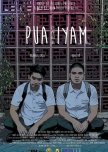
A small student work with immense power
The first thing that catches the viewer's attention is seeing a boy in a school uniform shaving his head with a cut that is too deep, almost releasing blood, while crying inconsolably. This is what Juan Pablo Pineda III, the director and screenwriter of the LGBT+-themed romantic short film 'Coming Out' (Pua Iyam, for its title in Tagalog), wanted to convey, since it is the true essence of the film.Ken, a Chinese-Filipino teenager, has known his true identity for a long time, but has not dared to reveal it out of fear. However, reading a book titled "Pua Iyam" gives him the courage to confess his love to Miko, his best friend since childhood.
Going back to my opening words and the first scene of the film, Ken cries and shaves his head because he has been rejected. And Miko, although she also loves Ken, knows that her family and society will not understand them and "I am not prepared to admit what I am", referring, of course, to his homosexual condition.
If I say this it is not to issue spoilers, but to express in words what the short film subtly lets us see: the fear that the two boys suffer of discrimination and rejection by society due to their sexual orientation, which is why They feel insecure about their identity and avoid revealing it to others and to themselves. They prefer to suffer and make the person they love suffer before recognizing and loving themselves.
The objective of the short is to make a complaint against homophobia, that is, the aversion towards homosexuality or against homosexual people, and its eternal companion, internalized homophobia.
In the final scene, while Ken and Miko are playing after reconciling as friends, they both stare at the camera. Could this be a sign of hope? Will Philippine society ever come to respect all its members equally, regardless of their gender identity or sexual orientation?
Starring Rowi Du as Ken (who also produces, edits and sounds) and Raphael Cruz as Miko, the film had its world premiere at the Far Eastern University (FEU) SinePiyu Film Festival - Manila, in which it won the Awards for Best Film, Best Performance for Du, Best Direction and Best Poster in the Black Reel category.
The film follows his journey through different Philippine film events, such as the 7th. CineSB: Indie Un-Film Festival of the University De LaSalle College of Saint Benilde, in Manila, and the University of the Philippines-Diliman, and wins in the categories Best Direction for Pineda and the Gold Award for Best Film for the team of production by IndieGo Pictures, and the Awards for Best Production Design and Technical Excellence in the Sibol Category of CineSB 7: The Main Installation of DLS-CSB.
The film takes home the award for Best Cinematography and another special mention from UP Cinema's Piling Obrang Vidyo jury's decision, and obtained the Cardenal Bronze Film Award, Best Editing and Best Photography in the intercollegiate category of CineMapúa 2018.
The film is also selected as part of the 2017 CineMakulay Film Festival, the 29th Gawad CCP for Alternative Film and Video of the Cultural Center of the Philippines. It is also exhibited as part of Eksena 2017 organized by Dalubhasaan ng mga Umuusbong na Mag-aaral ng Araling Pilipino (DANUM) DLSU.
After winning the awards for Best Screenplay and Best Actor in a Leading Role at the 9th Largabista Film Festival in Tacloban City, Leyte, and a special mention for gender sensitivity at the First Palawan International Film Festival, the short film 'Pua Iyam' continues its journey beyond the Philippine borders and reaches the United States and China.
On North American soil, 'Pua Iyam' is screening as part of the "Queer Stories" section of Diwa Filipino Film Showcase, the film festival held in cooperation with the annual Pagdiriwang Filipino Festival, celebrating the Filipino spirit wherever it resides by sharing Filipino and Filipino-American stories with the community of Seattle, United States.
And then it competes for international recognition at the PRIDE Film Festival in Shanghai, China, and the Beijing Queer Filmfest, in the capital of the Asian giant.
If I list so many awards and achievements it is not to waste words, but to highlight how this small work, carried out by a Communication student from the Far Eastern University (FEU), in Manila, has immense power to make audiences reflect on the need to advance against heteropatriarchal discourse.

Motorcycle, love triangle, sexual awakening, indie cinema and for LGBT+ visibility
Who doesn't like movies that portray young loves? It is a cinematographic subgenre that has a special charm, because it is very easy to identify with the characters who experience those first tickles in the stomach and an unknown sexual attraction towards another person.Who doesn't like movies that have the motorcycle as another protagonist, being one of those in which the good guy is better, the bad guy worse, to save the world, to chase evildoers, to escape from the abyss, and also, of course to fall in love?
Who doesn't like movies in which a guy lets the co-pilot hug his body to avoid falling off the motorcycle?
Who doesn't like movies in which the boy claims he's never hugged anyone before, and the other admits that it's also the first time he's allowed himself to be hugged by another person?
Who doesn't like movies in which from the action on the road to the connection between two people, embraced side by side, they transport us to worlds full of adrenaline, adventure and a deep love on two wheels?
But what will happen if we add a third love interest to all this? What will happen if instead of two guys on a motorcycle, there are three people on two wheels who end up involved in a love triangle?
Starring Fongfong Pathomporn Panfa ('My Star' and 'My Star: Uncut Version', both 2024), as Gentle, and Jo Ronaporn Vipataputi ('My Streamer', 2023 and 'Boy Scouts', 2022, 'My Star' and My Star: Uncut Version', 2024), like Motor, the film 'My Biker' talks about the discovery of sexuality in adolescence, sexual awakening and, more specifically, what it means to accept one's own homosexuality. It is, in essence, a story that supports diversity and also LGBTIQ visibility. Gentle discovers his sexual orientation in a heteronormative world by spending time with his best friend, with whom he establishes an emotional and sexual connection.
'เราและนาย My Biker' is an original short film by Wayufilm Production, in association with Pigeon Pictures, following 'The Internship', 'Monochrome' and their first sapphic short, 'HER'.
Set in Chiang Mai, Thailand, and written and directed by Nitchapoom Chaianun (Nicchi), the short tells us how Gentle and Motor share a vacation before the restart of the new school year, and plan to use their free days to tour the region by motorcycle. and take photos of the landscapes of the places they visit.
But suddenly Gentle's motorcycle breaks down, forcing him to ride behind Motor's big motorcycle, meaning they may be closer to each other than they've ever been before.
After a first outing, Gentle spends a night at the house of the neighborhood boy who, riding his motorcycle, goes through life at full speed, except in the moments when he carries his friend on his back, because he fears he will fall.
There is something universal in the story of Gentle and Motor, and it could not be otherwise, this being a romance like all the others.
The next morning, the handsome young man who seems insensitive to love, meets outside the house with Namwan, his girlfriend, with whom he has made an appointment, and Gentle, from the door, watches them play between laughter and mutual loving interactions. When getting on the motorcycle to go for a ride, the young woman hugs Motor's torso, and Gentle remembers how he did not dare to put his arm around her body the day before.
By silently observing them before being left alone, it is enough for Gentle to discover that he is in love with his friend. Those unique and inexplicable feelings, those jealousy that he feels for the first time in his short life, cannot be anything other than that the attraction he feels for Motor goes beyond friendship. "I want to be close to you always. I want to see your face every day," he will assure her when they meet again.
Gentle will discover that travel and big motorcycles are not the most important things in the world. How will Motor deal with Gentle's sudden confession? Will their friendship go beyond love?
When he has confessed his feelings, both will understand that from that moment on not everything will be as it has been until now.
A textbook 'coming of age' that, however, goes further in this slow-paced film that begins to gain momentum at times, until it shows that its director, the Thai filmmaker Nitchapoom Chaianun, is committed to the need to uncover a a topic that still carries many taboos, such as homosexuality, especially in a country that refuses to recognize equal marriage and, therefore, homosexual relationships.
I like the performance of the two young actors, as I am equally fascinated by the tangible chemistry and the growing discomfort, which feels real, organic, between the two as they make another journey, not on a motorcycle, of discovery and acceptance of sexuality. The new actors especially caught my attention because of their facial expressions and body language.
I have stated it on other occasions: I highly value the works of Wayufilm Production for their good execution, level of acting, filming and production, despite their low budget, for their simple stories that are much closer to real life, actors and a truly passionate production team in each installment, and a firm determination not to kneel before the giants of the entertainment world with their very common mediocre stories interested only in making money, and whose proposals frequently fail, among other reasons, for not taking into account seriously to his fans.
Furthermore, the editing team chose exceptional music to accompany the miniseries.
I also appreciate the tenacity of the creators to not succumb to the dictates and whims of commercial companies, eager to contribute funds to the production of many BL audiovisuals in exchange for advertising their products, something that we frequently criticize in other series of the genre, thus respecting Wayufilm Production its ethics and principle of being a production company that is committed to indie cinema.
'My Biker' joins other dramas authored by Nicchi with which he addresses issues related to sexuality and gender identity, as he has done since he debuted with his first short film 'Fresh' (เฟรชเฉิ่ม), in 2006, which was followed by 'Fresh Cool Story 2' (เรื่องเฟรชเฉิ่ม 2).
Committed to portraying the diversity of human relationships with sensitivity, dismantling prevailing stereotypes regarding what is "normal", and contributing to the struggle of Thai LGBT people, Nicchi, as he likes to call himself, has obtained popular recognition with his films and series BL-themed, such as the feature film 'My Bromance' (พี่ชาย, RTGS: Phi Chai), 'My Bromance 2: 5 Year Later: The Series', 'My Bromance: Reunion', 'Key Love', 'NightTime', 'The Rain Stories', 'Yantra' (อาถรรพ์ยันต์มหาเสน่ห์), among other shorts and series.
I owed my readers a review. He owed me a review. Learning about the upcoming release of 'My Bike 2' encouraged me to watch the short film once again and write it.
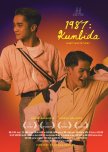
The reunion with oneself
Captivating and irresistibly beautiful, '1987: Kumbida' is a romantic short film with LGBT themes, directed by Aireen Remoto, who is also in charge of photography and script from a story by KL Rico.Released in 2020, the film tells the story of Joaquin (Glenn Mhar Balmonte), a closeted, introverted and deaf gay boy, and Isagani, or just Gani (Joseph Manuel Galapon), as his loved ones know him, an openly gay, cheerful young man. and boisterous, who dreams of becoming a well-known journalist. They will both meet at a friends party and in the middle of the long, sweet night that awaits them, the couple of Filipino teenagers make each other discover their true selves through confidences, music and dance.
As the title portrays (kumbida means "to invite"), this moving film shows us what it is like to hide who you are and who you love in the late 1980s.
Always based on the margins of the independent Filipino homosexual film movement, its director gives us a sincere and visceral coming-of-age story.
Finalist of the Gawad Sining Short Film Festival 2020, the film makes a virtue of its scarcity of means and also gives us an emotional and poetic story about the impact that one night can have on our lives. The performances are deep and well done, the young actors give themselves in a way that makes us feel a connection between both characters.
The total dedication of Glenn Mhar Balmonte and Joseph Manuel Galapon to giving life to the protagonist couple ensures that the viewer ends up totally involved with the characters, wishing the best of possible futures for these two young people, whose relationship can lead to love. Both characters become that voice for those people who are still afraid to reveal themselves.
Joaquín and Gani's story conveys their struggles and the circumstances they have to overcome for the simple fact of being part of the LGBTQ+ community. The film aims to break gender stereotypes and will be beneficial not only for members of the LGBT+ community, but for all people. Likewise, the elimination of discrimination is proposed, promoting equal rights for all human beings and the desire for acceptance, at a time of approval of the SOGIEB bill. Carrying out this effort was not prevented by the pandemic caused by Covid-19 or Typhoon Ulysses, which put the lives of all those involved in the filming at risk.
While Isagani (Gani) hangs out with his usual gang of queer friends at the house of one of them, on a typical night, Joaquin arrives at the party. Gani has been wanting to get intimate with the newcomer for some time and, despite both living in a small rural provincial town where all the neighbors know each other, he has not dared to introduce himself properly because he considers it too serious.
His friends, aware of the attraction that arouses in Gani, encourage him to talk to Joaquin and they both enjoy the festival together.
It doesn't take long for the two young men to be talking. Although Joaquin receives Gani coldly, he will soon be infected by the boy's joy and will first begin to smile timidly at him, and then soon find himself involved in a lively conversation, verbal on one's part, and through gestures and sign language, on the other hand. the other.
They will leave on a bicycle, taken at random from a yard on loan, since they did not ask the owner for it, and now pedaling one, now pedaling the other, they will continue their journey of discovery and acceptance.
Unintentionally, the night out will end up turning into an adventure that will result in something completely different than anyone could have foreseen. After hours under the starry sky, bike rides, the sudden rain that comes while they are sitting on the banks of the river, where Gani will take Joaquin to show him his favorite place, where he goes every time he wants to breathe, and to ask for a wish after the passing of a shooting star, the two teenagers will begin to get to know each other better and make all kinds of confidences.
Gani will talk about his dreams of becoming a journalist to report only with the truth, about when he arrives at university in Manila, the first thing he will do is take a bath because the capital's water "has chlorine", about his desire not to disappoint others. his loved ones, especially his parents, the need to be accepted as he is, that nothing changes in the future, especially with his family, that he owes it to his friends to have confidence in himself, the feeling of emptiness inside him "perhaps because he is gay", that he has set out to prove that "although I am different I can achieve my dreams", of his right to decide and choose, of his fears and his insecurities. In silence, Joaquin listens carefully, and as a sign that he agrees with his new friend, he will take one of his hands and bring it to his heart so that he can hear the beats well.
And they will dance under a sky that already shows the approach of dawn, to the beat of "Isang Buong Araw Kasama Ka", performed by Akom Ayalam, and Sayaw NG Buhay, by Nathaniel Cabanero.
Sharp, moving and with memorable performances, despite the youth of its protagonists and the fact that they are not professional actors, which gives greater naturalness and conviction to their performances, the film has several sequences between the actors where an intimacy is built. credible and profound that, together with several sequences of monitoring and observation of Gani's character, are the most valuable moments of the film, in my opinion.
I like how intimacy begins to boil in the heat of Gani's confessions and Joaquin's complicity, two people who face their loneliness from diametrically opposite emotional places: one who has not come out of the closet and the other who trusts that his family will. he accepts, but finally discovers that this is not the case.
'1987: Invitation', by its English title, is a film about a brief encounter that will radically change the lives of two teenagers, made from a disarming humility, set in La Isabela, in the Administrative Region of Cagayan Valley, Philippines,
In a homophobic society, like the Philippines, where there is no type of recognition of same-sex couples in the form of marriage or civil union, therefore, it does not recognize homoparental families either, the film is a small triumph. in a sea of defeats, where calm and honesty take over the narrative to give us hope at the end of the tunnel.
The invitation that its own title suggests is to reunite with oneself. Joaquin rediscovers himself through Gani, and that rediscovery is what allows him to spread his wings and come out of the closet, now free of all social prejudices, cultural ties and internalized homophobia, as some of the reasons that have made it difficult for him to come out of the closet. closet.
Accompanied by brilliant performances and a solid narrative, the film, which does not have a high budget, covers the transformation of the protagonist, a boy who finally accepts his homosexuality and is not afraid to show it to the world, thanks to the arrival into his life of a neighbor. with whom he had never exchanged a word.
The importance of the film lies not so much in its themes and display of diversity, but in its deeper approaches. '1987: Kumbida', is a story full of sincerity and humility, of narrative and formal intimacy that becomes an aesthetic exercise in the search for happiness: a beautiful idyll of the reunion with oneself, and that has the ability to bring to all types of audiences the question: why are we not able to look at the love between two men with "normality"?
The film takes a look at the growing love of two different people who stop their emerging true love for themselves and each other. In this sense, it proposes to debate the dilemma of accusing others of being wrong or lying about who they are, or of trying to accept that, sometimes, what is traditional is not always correct.
'1987: Kumbida' is a mirror for society to look at itself and understand the acceptance of what is different, and to understand that love is not limited by gender or anything else.
In this sense, we are all Gani and Joaquín in our own way, since we always want to be heard, loved and accepted.
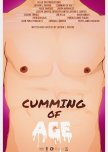
Gay sex and artistic orgy
Writing a literary text in which young gay people participate in an orgy is difficult for Augustus Vera, or just Age, as he likes to call himself (played by Jason Maghacot), a young aspiring writer. He knows it very well, as he, almost twenty years old, can only satisfy himself by unloading his semen on the typewriter.How can you talk about the physicality of the bodies and the intensity of desire in the looks of the guests at these group sexual activities, when you have never experienced one of them? How to cover with skin and nerves the skeleton of characters who are ardent in granting and receiving pleasure in those erotic parties, while they frolic in those places located in basements and closed rooms, a faithful reflection of their occultism, before the hypocritical Puritan society that, while condemning homosexuals with stigma and discrimination, prefers to look the other way and allocate their money to the creation and consumption of literary works that represent heterosexuality, as the only form of family conceivable and accepted by conservative and heteronormative societies. ?
How could he not know it well, when he can only give himself pleasure in the solitude of his room, with the typewriter as his only witness.
You have done your research, you know the subject well, but you lack the experience. That is why the literary character that seeks to involve in an orgy subculture does not flow. It fails to give the desired closure to the story. And there are only a few days left to present the story in a writing workshop. Editorially speaking, it is hard pressed for closure.
To his rescue comes Andrew (Roco Sanchez - 'Lyric and Beat Cinema Cut'), a young man who also pressures Age to overcome his doubts about finishing the story. In this way, his literary character is based on Andrew, this persuasive, bold and adventurous boy.
With his help and the people from the literary workshop, Age finishes his story by stepping out of his comfort zone and potentially participating in what he doubts the most about.
Finalist of the CineMapúa 2020: Online FilmFest, of the University of Mapúa, and the 18th Annual Student Short Film Festival, 'Cumming Of Age', is a short film written, directed and edited by Jayson E. Santos, who also acted in the film ' Under the Sun'. The cinematography is by Harold Lance Pialda.
Using metalanguage, the Filipino filmmaker addresses a subculture that engages people in information and awareness about safe sex and sexual practices that occur in his country.
Attracted to raising awareness about different social issues through his work, Jayson E. Santos has stated "that every individual is worthy of consummate knowledge of consciousness that will nourish him through different artistic mediums," such as his own films. .
That is why he does not hesitate to present a massive gay orgy in his film, which is artistically integrated into the plot.
Gay sex has been in the world of film and television for a long time. It is becoming more and more common and although it seems that it always has to have the extra point of morbidity compared to heterosexual sex, we continue to see it with mischievous eyes. The fact is that if a gay sex scene is already morbid in itself, imagine an orgy.
With a daring and brave ending of explicit sex that occupies around two of the 18 minutes of footage, without wanting to resort to ellipsis, in the manner of other film proposals, such as 'Irreversible', by the Frenchman Gaspar Noé (Irréversible, 2002), with the rape scene, or 'The Taste of Watermelon, by the Taiwanese Tsai Ming-liang (Tian bian yi duo yun, 2005), with the also abhorrent sexual force at the end of the film, Jayson E. Santos shows situations and moments that exude authenticity and a poetic atmosphere of pure intimacy.
Unlike 'Theo and Hugo, Paris 5:59', by French co-directors Olivier Ducastel and Jacques Martineau, the Filipino filmmaker suddenly introduces the viewer into a visual orgy where passionate young men of great beauty give each other warmth and love. . The photography also stands out in an outstanding way, highlighting the enveloping atmosphere, recreated in dark tones, in which a group of people enjoy their bodies.
In this way, what begins on a purely literary level leads to an encounter portrayed in a daring pornoerotic style, thus giving a twist to the topic of gay promiscuity without falling into the outrageous, corny or banal.
The key scene we are talking about is the one that takes place between Age and some strangers with whom they have an unforgettable party. We love the moment in which the young man recreates an internal monologue very consistent with the experience he is living.
Accompanying this central search for the construction of a character in a literary work, there is no shortage of references to professional and humanitarian concerns, such as protection and safe sex.
A couple of scenes, in a practically empty room, in a swimming pool and a room where writers and aspiring writers meet, while they dissect their respective works in a critical and intellectual exercise, give a tremendous touch of humanity to the story of a writer who wants to finish his story to present it in the literary workshop.
I recommend the short film to those people interested in reflecting on sexuality, literary creation and the construction of literary characters, through a film with one of the best orgies in Philippine erotic cinema.

A 'My Own Private Idaho' without a road trip
The plot of this film places us on the island of Taiwan, where a story is told through Chengxi Yuan (Joseph Huang), a 13-year-old student. He tells us how his father, Zheng Yuan (Spark Chen), who died 95 days earlier after battling cancer, had been having a homosexual relationship with the young actor and theater director Ah Jie (Roy Chiu), thus deceiving his mother San Lian (Ying-Xuan Hsieh), who is now angry because her husband had put his life insurance in the name of his lover, thus depriving the minor of financial benefit.It is from then on that San Lian will demand the insurance money from Ah Jie, an attitude that will not please his son at all, who, being not only in mourning, but also trapped in the middle of a complicated legal battle between the two adults , she will run away from home and go live in the home of her father's lover so as not to see her, causing the displeasure of both her mother and the man in whose arms her father dies.
The rebellious teenager knew that his father was gay, but had no idea who he had left his mother for. Now he is drawn to the man's fickle nature and his relationship with his father. This event will force the mother to reevaluate her relationship with both of them.
While San Liam blames Ah Jie for not only taking her ex-husband's life insurance money but also ruining her marriage, in therapy and fed up with a mother he considers money-hungry and indifferent, Chengxi Yuan begins to spend more time with Jie in an effort to find out who the "bad guy" is in this situation.
In the young boy's eyes, his mother becomes "Liu San Lian 2.0", as Chengxi Yuan tells his therapist. Angry, demanding, authoritarian, and prone to drama, the teenager can no longer stand his mother's tricks (including throwing away his father's cards), prompting him to seek out Ah Jie, even if it is to threaten to jump from her. balcony.
During the course of the film, we will see flashbacks of the relationship between Ah Jie and Zheng Yuan, who was forced to marry a woman in order to be "normal", since we must not forget that homosexuality in Taiwan continues to be seen as taboo and indecorous, as occurs in other Asian countries, such as Japan, South Korea and Thailand, despite same-sex marriage being legal since 2019, the year after the film was released, which makes it 'Dear Ex' is even more timely, revolutionary and innovative.
We will also know what has happened to the insurance money, for which San Lian will be willing to do anything just to get it (and in part also Chengsi Yuan, since she needs it so that her mother can send her to study in California and thus lose her. of sight). In all of these, Jie has the same intentions, since he is bankrupt after putting his savings into making his lover's last days more bearable, as well as his professional work in the theater.
We will also learn the reason why Saint Liam is a loud and authoritarian mother and ex-wife. The subsequent scenes will show us how much pain he had to endure throughout his life. The actress does a good job of conveying emotions and feelings.
On the surface, Ah Jie is presented as a typical "husband thief" and is called a "fag" by San Lian on more than one occasion. For her part, she is seen as a bitter, authoritarian woman and a despised mother. But when we get to the end of the movie, their roles in Cheng Yuan's life become more focused, as does Chengxi Yuan's role in this triangle.
The doodles drawn by Chengxi Yuan that animate the screen add to the understanding of the story, obscuring and enhancing the live action images below. However, the film's campy qualities should not be taken as fatuous. It is a remarkably moving and compelling painting.
In this way, between the present narrated by Chengxi Yuan and the visions of the past, we will learn the true story of this love relationship, especially the period in which the lover becomes Zheng Yuan's caretaker as cancer devours his body. .
This complex, moving and timely Taiwanese story of pain, intolerance and family infighting, in its narrative arc about a journey of discovery for its three protagonists, in a society where LGBTQ rights are not as advanced as in North America and Europe, It reminds me of 'My Own Private Idaho', without the road trip.
'Dear Ex' feels like a coming-of-age film for its three leads, even though Ah Jie and San Lian are in their thirties. It's not that the trio of main characters end up as friends, drinking soju in a bar, but they all come to understand that they contributed to Cheng Yuan's life and why things happened the way they narrated. There are some leaps of faith in the film's editing, and much of it seems to be disguised by the teenager's voiceover.
This is the first feature film by Mag Hsu, a theater writer and director (she could not resist capturing it in images in the film), whose television scripts have been nominated for various awards throughout Asia. Among his most popular works are 'Mars', 'Silence' and 'In Time with You'. The film in question is co-directed by filmmaker Chih-Yen Hsu, known for being one of the most popular music video directors in Taiwan.
It is not a perfect film. Its Achilles heel lies in the fact that some viewers may find the pace of the film slow at various points, which can cause the plot to become diluted in some aspects. Additionally, the morals of 'Dear Ex' may be difficult for some people to understand.
Against it could also be that the film visually resembles a soap opera, and this is because the directors have extensive experience in television.
Still, it is worth noting that it is an important film made with love from the perspective of narration and interpretation. The splendid direction, photography, editing and editing allows this story to be shaped and guides the viewer in a masterful way.
As the film progresses, the story fractures, traveling back and forth in time as the three characters struggle to reach a point of reconciliation. The stereotypes of San Lian as a manipulative shrew and Jie as an opportunistic rogue fade away, leaving only the tenderness and sense of betrayal they both still feel toward the man they loved. Roles change, as do the characters' feelings for each other.
At times, the film threatens to descend into melodrama, but the attentive directors always knew how to right the course, balancing oversaturated flashbacks with a nuanced portrait of love that withstands both tests and time.
'Dear Ex' offers an interesting look at family relationships, with a bold narrative and bold direction. The film is full of well-developed characters and situations that force us to rethink the idea of family in modern society.
From the comedy-drama, romance, homosexuality and theater genre, the viewer can see that it is not a very simple plot, showing us the social reality of Taiwan, to which is added a homosexual love relationship that is, possibly, one of the most beautiful , although also dramatic, that has never been made into a film.
All this, of course, had its recognition, since the film, after its premiere at the Far East Film Festival, held in the city of Udine, Italy, won the awards for Best Film Narrative, Best Leading Actor (Roy Chiu) , Best Leading Actress (Ying-Xuan Hsieh) and the Press Award at the 20th Taipei Film Awards, to which were added the victories of Best Leading Actress (Ying-Xuan Hsieh), Best Original Sound and Best Edited Film at the 55th Golden Horse Awards (along with five other nominations including Best Picture and Best Director). It also won the best director award at the Hong Kong Asian Film Festival.
If I had to summarize, I would say that 'Dear Ex' is an insightful look at the ways people process grief under difficult circumstances. It takes a few moments to explain the film's central problems, just as the story unfolds in a matter of minutes, while the filmmakers largely let their tight script and exceptional performers convey the characters' complex emotions and motivations. brilliantly.
But the film is more about the people than their problems. And the three characters who star in the film are imperfect and partial human beings, but each one contains emphatically sympathetic and credible traits.

'Ben X Jim Forever': Two soulmates condemned to suffering and oblivion
Regal Entertainment Inc.'s 2021 Filipino boy love (BL) romantic drama 'Ben , two people who, after going from friends to lovers, become strangers with memories, after a sad family secret is revealed that they were both unaware of and that causes the breakup of their love relationship.Set in a period marked by the pandemic caused by Covid-19, the series, retitled 'BXJ Forever', is told in this second season from Jim's perspective. From there, it is shown how mutual the attraction between the two really was, which would explain some of the flaws in Jim's character development in the first season.
Viewers learn more about Jim's relationship with his father and how this has broken him. We appreciate both young people equally and can analyze their thought processes and feelings.
Jim cannot conceive that his childhood friend and later lover is no longer a part of his life. After throwing everything away because of Ben's decision, Jim now works as a barista.
The series revolves around Jim's continued search for Ben after he disappears after the unfortunate ending of the first season. With the help of friends, Jim tries to find him, while recounting all the good times they had through letters that will be revealed that he sent to Ben, over the years, until June 5, 2015, his last letter.
The series stars EJ Jallorina as Francia, Ron Angeles as Olan, Kat Galang as Flo, Sarah Edwards as Yana, Vance Larena as Val, Royce Cabrera as Roy, Miko Gallardo as Bogs, Darwin Yu as Dante, Jomari Angeles as Burn and Johannes Rissler as Leo.
Over the course of the show's two seasons so far, the star-crossed lovers struggle to regain their relationship amid family drama, third parties, and the challenges that come with being queer in today's world.
Ben and Jim have everything to live a beautiful love story: they are young, single, handsome and deeply attracted to each other. It won't take them long to realize that they are made for each other. But a family secret catches up with them and has fractured them as a couple. In your case, the breakup is not caused by heartbreak, disappointment, or the extinguishing of the fire of passion. Both are still in love, but Ben has put a distance between the two out of shame that Jim will know a dark past that involves the parents of the two boys.
We witness the subtle construction of their new lives, and we observe their movements after the breakup of the love relationship. Can they forget what they were as a couple? Will they be able to recover their love?
With an insightful cinematographic staging with insistent and expressive camera movements and intelligent use of scenery and locations, Easy Ferrer, its director and screenwriter, tells in the continuation of the series that Ben is more open about his identity and how Jim Learn about political correctness when it comes to LGBT+ terms and issues. This theme is explored further and more pointedly in this second season, with the passage of the SOGIE bill being an underlying discussion throughout the eight episodes.
The drama brings a more bittersweet and grounded reality of love and the consequences of fighting for love. Through transgender characters (correctly played by transgender actors EJ Jallorina and Rica Castaño), the series contributes to the debate on the spectrum of sexuality and gender.
Through more diverse subplots and the addition of new characters, 'BXJ Forever' addresses themes such as internalized queerphobia, sexual exploration, discrimination in the workplace, cancel culture, the need for sexual positivity, general positivity, gender reassignment and self-validation, maturity issues, and social media toxicity.
The series contributes to making the struggle of LGBT+ people visible through in-depth political debates, with identifiable stories.
The story tends to get overly complicated. The narrative loses cohesion with the incorporation of new characters and conflicts that contribute little to the main story. Tends to rely on narrative and character clichés.
At times, it seems that it is no longer Ben and Jim's relationship as the main plot that is being narrated.
Some stories and events are also messy or inorganic, such as the fact that Ben suddenly resolves to return to the world he abandoned, six months ago, once he decides to unilaterally break up with Jim.
The context of the story taking place in the midst of a pandemic then becomes an afterthought, and elements indicative of the health crisis, such as mask-wearing and physical distancing, are inconsistently portrayed.
Three years after finishing the second season, I highly doubt the story will be resumed to give our protagonists a happy ending.

Denounces the harsh reality that Filipino LGBT people live
Despite the numerous North American military bases that curtail national sovereignty and being considered a strategic ally of the United States in the region and a tourist paradise, the Filipino population suffers from hunger and misery.The cinema of that Asian country has produced films such as 'Soon of Macho Dancer', ('Anak Ng Macho Dancer'), from 2021, by multi-award-winning filmmaker Joel C. Lamangan, as well as 'Macho Dancer', 1988; 'Midnight Dancers' (1994), 'Burlesk king' (1999), 'Twilight Dancers' (2006), all directed by the late Mel Chionglo, and others, interested in exploring the world of dancers who pose in light clothing and even naked, for the homosexual clientele of the Filipino establishments.
The reality is that films like these expose how rentboys confront the sordid realities of poverty in the Philippines. Most of the characters in these films have in common that they are from the provinces and are overwhelmed, defeated by the sad political and socioeconomic reality of the Philippines, which is why they will be forced to travel, generally to Manila, the capital, to exercise their Prostitution as a way of escape from misery.
'AL and ER: Boys in Love' nods to these films and these "sex professionals", but does not present its narrative heroes acting and prostituting themselves in venues and clubs, existing today, as the sex workers of those do. movies, but in their own homes, selling their bodies and their orgasms via social networks, perhaps even through an erotic dance like those.
And the solution cannot be any other for desperate people who have no other way to get through everyday life. It is impossible to evaluate 2020, when 'AL and ER: Boys in Love' was filmed and released, from the perspective of the rights of LGBT+ people without recognizing that Covid-19 created an obstacle and brought a hectic, cruel year, especially for the members of this human collective. The pandemic exposed inequality gaps, leaving some more vulnerable than others when it comes to infections, prognosis and economic impact.
In countries like the Philippines where LGBT people face social stigma, moral opprobrium and legal discrimination, they have fewer economic opportunities and are more likely to be poor, even more so when some members of the community were left out of recovery measures government economics. At the same time that they were fighting against the consequences of Covid-19, LGBT people also had to face the increase in the avalanche of homophobia and transphobia that they generally suffer every day, exercised by governments, politicians and in many cases the public. in general.
Prejudices against the LGBT community were evident in responses to Covid-19 in all regions of the world. While in South Korea, social media users scapegoated LGBT people after some media outlets linked an outbreak to gay bars, and in Hungary, populist leader Viktor Orbán used health emergency powers to pass laws. Discriminatory measures against transgender people, in the Philippines, local officials humiliated LGBT people while enforcing a curfew and a gender-sensitive quarantine.
Thus arose the idea of filming an LGBT-themed short film in the context of the current socio-political situation in the Philippines, which aims to creatively represent the harsh realities faced by Filipino gays, lesbians, bisexuals and transgender people today.
Of friendship, yaoi and romance genre, 'AL and ER: Boys in Love' follows a provincial homosexual couple residing in Manila, made up of Al (Jomari Angeles) and Er (Jerom Canlas), who have lost their respective jobs and their savings and do not know how to survive in the midst of daily shortages and difficulties, to which is added the risk of dying due to contagion with the new coronavirus.
This is how Ar came up with the idea of using technology and social networks to film sexual videos in which the two young people appear in different erotic poses, in order to later place them on the Internet with the purpose of selling the images to potential buyers. . However, Er opposes using this route to overcome economic difficulties for fear of being recognized, and proposes returning to the province, where they come from.
I have given too many spoilers. Not one more. You'll have to watch the short's nearly 11-minute run to find out how it concludes.
In this sense, only add the well-used silence in the concluding and defining moment between the two actors, and even with the closing of the incidental music, as an epilogue to the previous situation created at the moment of tense silence. Right there, when the moment of silence arrives, a much greater tension occurs than if silence did not exist.
Written and directed by Ryan Machado, AR + ER, as it is also known, is Kayumanggi Kolektib's first BL film, in an anthology of other short films to follow.
While Canlas and Angeles achieve excellent acting performances and a necessary control of the body and voice when they interpret emotions, such as insecurity, fear, shame and even anger, disgust and sadness, Issa Encarnacion takes the cake as director of photography.
In the midst of the pause due to the pandemic that led to the cancellation of premieres and filming and the confinement of actors and film production experts to preserve their lives, the Philippines managed to film several audiovisuals, but generally of the romance genre, many of them BL . However, Ar + Er sets the bar higher and denounces the harsh reality experienced by the inhabitants of that country, especially members of the LGBT community.

It fulfills its objective of serving as a link to the long-awaited sequel
The group of friends from Golf High School ("Fluke" Teerapat Lohanan) and Bank ("Fluke" Sripinta Pongsatorn) have gathered (hence the title) in a house to spend a day of vacation dissipating the summer heat in a pool. They have left high school behind and are now pursuing university studies. Despite having each embarked on their own path, they maintain friendship and contact with each other.While they are having fun between games and jokes, Golf appears, who acts as host and has invited his friends, as on other occasions, to share time like this with him. The attentive public expects that at any moment Bank will join the group and resume the love relationship he had with Golf. But this does not happen.
This is how the viewer understands that contrary to what was narrated in the film 'My Bromance', Golf did not die of a brain disease as Bank was led to believe. Golf, along with his friends and parents, have lied to him about him being dead. While Golf tells Tar (Worakamon Nokkaew) that he still misses Bank, Tar and Parn (Varatchaya Comemamoon) respond that they also feel bad for cooperating in the lie.
'My Bromance: Reunion' (Thai: พี่ชาย, RTGS: Phi Chai), also called 'My Bromance Special Episode: Reunion', the Thai BL and LGBT-themed short film directed by Nitchapoom Chaianun, is not intended to follow the romance between these two boys.
A question that the public asks: why the short film? The story of Golf and Bank had its end with the death of the former while the latter would remember him not only for having been his youthful love, but also for saving his life by donating his kidney. But the impact of the film, both inside and outside Thai borders, led the filmmakers to take up the story in a later sequel, but to do so they needed to explain that Golf had not died.
Regardless of whether or not you like what is shown on the screen or how unethical you can see behind a lie for whatever reasons, the truth is that the short, released on May 18, 2015, fully fulfills its function of continuing the events narrated in the film 'My Bromance', by the same director and released a year earlier, as well as serving as a link to its long-awaited sequel 'My Bromance 2: 5 years later', from 2020.
In this way, the creators could resume the story interrupted with the "death" of Golf, to introduce the viewer to the subsequent continuation of the romance: after the traffic accident they suffered, Golf has not died, as they made Bank believe. . Golf continues with his studies, although he still suffers from the aftermath of the tragedy.
Instead of confronting his parents, his immaturity led him to lie to the person he loves, because he considered that the farce is a good idea to make Bank forget him and thus be able to turn the page on that romantic relationship so frowned upon by his parents. both boys.
However, Golf has not been able to forget Bank, and he will ask his friends to continue giving him a gift from them every year, on Bank's birthday.
The sad, distressed looks of everyone show that, deep down, they do not agree with the situation and they hope to be able to reveal the truth to Bank at some point and that the two boys, if they wish, can continue with their romance. .
And so it will happen, but it will be reviewed at another time.
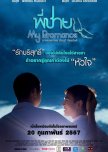
An obsession that haunts human beings: seeing people who hate each other love each other
Golf (Teerapat Lohanan) is an 18-year-old young man who lives in a wealthy house but with a dysfunctional family, whose parents have barely taken care of him. Her mother has died and she now lives with her aunt and her father Vut, who is constantly on business trips and whom she blames for her mother's death.After being orphaned, he has changed his behavior from being an athletic and active young man to behaving aggressively and temperamentally. His friends describe him as a playboy and foul-mouthed. From his father he has only obtained little love and inattention, but a lot of money that does not fulfill his life. Circumstances have caused Golf to feel resentful towards his ancestor and this animosity has an impact on his personal and student life.
The Thai film 'My Bromance' ("พี่ชาย My Bromance", Phi Chai My Bromance) revolves around this axis, filmed in 2013 and released on February 20, 2014, which tells the moving story of two teenage stepbrothers who go from hating each other. to love each other passionately against all odds.
Set in Chiang Mai, this romantic youth drama with a BL and LGBT theme, has its turning point when Bank (Sripinta Pongsatorn), a gentle, kind and sweet-tempered young man, ends up moving to Golf's house, since the father of He and Thara (Chiangmai), his mother, have just gotten married.
Bank, a teenager four months younger than Golf, hopes to be accepted into his new family. However, his new stepbrother will make his life impossible, as he does not accept his father's new marriage or the fact that he now has a younger brother.
Directed by Nitchapoom Chaianun, the film follows the toxic and sentimental relationship that arises between these two young high school students who, due to their parents' marriage, begin to live under the same roof as "brothers." Despite initially teasing Bank, he and Golf can't help but get closer. Before accepting each other as stepbrothers, they must learn the art of living together, overcoming environmental obstacles and falling in love little by little. Will the feelings of love between siblings grow beyond that?
However, despite the abyss that separates them because they are socially considered "brothers" and their enormous differences in characters and personalities, both will begin to feel an irresistible attraction that will soon become pure fire and unbridled passion. Neither the continuous rivalry between the two nor the opposition of those around them will be able to prevent them from ending up lost and secretly in love, which will put their forbidden love to the test.
The synopsis of the film already tells us several keys to success, as previously demonstrated in other filmographies and generations 'Grease', 'My Fault' or 'Three Meters Above Heaven'. A teenage romance with hints of forbidden love on all sides, first because the family members resist the idea of the boys being homosexual and, secondly, the refusal to accept that both violate their status as "brothers."
Marked on the component "hate and love, between which there is but one step", the film narrates an obsession that haunts human beings: seeing people who hate each other love each other.
The chemistry between Golf and Bank is super special, it transcends the screen, and is totally enjoyable and emotionally impactful. It is a very passionate story of young love, which is the most intense, and above all loaded with a lot of action, in addition to being very visually beautiful.
If there is something that really stands out in 'My Bromance' it is the team formed by Teerapat Lohanan and Sripinta Pongsatorn, who give us great performances of their characters and share enormous chemistry on the big screen.
The first, within his leading role, performs a masterful characterization of Golf, taking into account that it is a complex interpretation on a psychological level. Perhaps at first he seems to us only a young man marked by the circumstances that have led him to disrupt his own life and he shows us an obsessive and somewhat egocentric and even selfish personality by not accepting his father's new relationship, which is why he comes to hate his stepbrother, but how with the passing of the minutes a change occurs in him that floods us with inspiration and hope.
Refusing to issue a single spoiler, it remains to say that the film has continuity in 'My Bromance: Reunion' (2015), 'My Bromance' (Channel 9/Line TV, 2016) and 'My Bromance 2: 5 Years Later' ( Line TV, 2020). About these related titles… we will be talking soon.
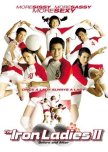
The struggle of LBGTQ+ people and the representation of stereotypes in Thai cinema (II)
'The Iron Ladies 2' ('Satree Lek 2') is the sequel to the surprising success of a gay volleyball team, having problems with their success and fame, and the way they reunite after breaking up, due to creative differences. .Youngyooth Thongkonthun repeats as director, but in the script Sayombhu Mukdeeprom joins Jira Maligool, to take up the story while the members of the volleyball team made up of homosexuals, kathoey (transsexual people) and a cisgender, meet to participate in another tournament.
when the royal team competed and won the national championship in Thailand. The two main characters, Mon and Jung, play two gay transgender women, who are constantly overlooked by volleyball coaches because of their appearance.
However, when Bee takes the reins of a local team after changing coaches, the call is issued to try out for a new team. When Mon and Jung are selected, most of the former players quit, leaving the coach in a difficult situation.
Mon and Jung are then forced to enlist the help of other gay and transgender friends they used to play volleyball with in college. These new players include Wit, who has not told his fiancée that he is gay, Pia, a transgender dancer, and Nong, a gay army recruit. When the competition begins, all but one of the players on the team are gay or transgender.
Due to their appearance on the pitch, many of the match officials intend to exclude the team, soon dubbed "The Iron Ladies", from the tournament. However, seeing the popularity of the team among the crowd will soon change their minds.
In the film's closing credits, the real "The Iron Ladies" are shown as they were at the time of the film's making.
The cast includes Sujira Arunpipat, Kokkorn Benjathikoon, Anucha Chatkaew, Surapun Chawpaknam, Shiriohana Hongsopon, Hathairat Jaroenchaichana, Giorgio Maiocchi, Peter Maiocchi, Chaicharn Nimpulsawasdi, Jesdaporn Pholdee, Phomsit Sitthijamroenkhun, Sutthipong Sitthijamroenkhun, Sahaphap Tor , Aphichart Vongkavee.
Note: The review of the original film of 'The Iron Ladies' 2000 can be found, in MDL, on the page dedicated to this film on said platform.

A story of great visual and auditory beauty, with great emotional depth
Won-Gyu (Won Tae-Hee), a German airline pilot, returns to South Korea after a two-year absence, but only intends to stay a single night. Victim of a homophobic attack some time ago that forces him to live abroad, a decision also motivated by his search for a place where his homosexual condition is more permissive and tolerant, he faces the judgment that the homophobic and conservative South Korean society has on homosexuality. .The protagonist tries to outwit his nightmare by living in constant transit. His home is anonymous and ever-changing hotel rooms, his connections with others temporary and rootless, of little significance to his life.
In one of those typical, completely evasive encounters, he meets Tae-Joon (Lee Yi-Kyung – (학교 2013/ Hakkyo 2013/ School 2013), a young gay delivery man on a motorcycle, whom he meets through chat websites. Despite Being a few years younger and having a less rewarding and paying job, Tae-Joon is much more comfortable with himself, including his sexual preferences.
On this basis, Korean director Leesong Hee-il writes and directs 'Baekya' ('지난여름, 갑자기'/'White Night'), a 75-minute film that has as its predecessor the short film 'One Night', with which he develops the trilogy known as 'One Night, Two Days' (백야), which includes the medium-length film 'Suddenly Last Summer' (지난 여름, 갑자기/'Jinanyeoreum, gapjagi'), and 'Namjjokeuro Ganda' ('Going South' /남쪽으로 간다), all from 2012, in which three unconnected stories are told that have gay themes in common.
Leesong Hee-il has an extensive filmography since his film debut in 2004 with the short film '동백꽃' ('Dongbaegkkoch'/ 'Camellia Project'), but is probably best known for his 2006 film '후회하지 않아' ('Huhoehaji Anha '/'No Regret'). In 2009, the director contributes to the overall project 황금시대 (Hwang-geumsidae/Short! Short! Short!), and also makes the feature film 탈주 (Talju/Break Away, 2009), before filming the short that begins the trilogy, in 2012.
As in the rest of the three pieces, 'White Night' tells a story of great visual and auditory beauty, but perhaps most important is the emotional depth. The raw honesty of the film's narrative – centered on the often deeply problematic feelings of its characters, all asking difficult but very real questions – is commendable.
Another characteristic of Leesong Hee-il's cinematography is the use of music that accompanies the images in a memorable way, with songs ranging from Western popular music to Korean ballads, being chosen with great care in the purpose. to instill a sense of peace, insane frenzy, sadness, uprooting, loss, abandonment, nostalgia or even melancholy, in contrast to the inner turmoil experienced by the characters.
With a high degree of concision, achieved within extreme brevity and economy of language, as well as by the semantic ambiguity and the interpretative potentials that the film offers, Leesong Hee-il reflects how Taee-Joon does not seek sex for the sake of it and, although not opposed per se to a one-night stand, he harshly rejects Won-Gyu. The director's goal is to expose how people relentlessly pursue a more meaningful and lasting relationship than a sexual romp, like the one Won-Gyu intends to have in a dark public bathroom frequented only by casual lovers.
However, as the night is still young, and these two almost strange individuals continue to gravitate towards each other, in this journey about the complexity of human relationships, accepting the other, emotional pain more than physical, and criticism To a society that still considers homosexuality a perversion, Tae-Joon learns, little by little, about the painful burden that Won-Gyu carries, while the latter, perhaps for the first time, sees an individual who simply accepts himself as such. as he is while accepting the other as he is.
Knowing that perfectionism can destroy creation, so he polishes his works seeking exquisiteness, Leesong Hee-il shows how Won-Gyu's internal conflict comes to the fore through the external conflict that arises when he meets again with a boy who knows about the past, before deciding to try to erase what happened in foreign lands. This climax comes surprisingly early, not to the benefit of the narrative, considering that the film begins as a short film and, perhaps, could have done even better to remain that way.
Furthermore, some of Tae-Joon's actions, in particular his decision to stay by the side of someone he barely knows and who displays quite erratic and then also violent behavior, are not entirely understandable. Be it sexual attraction, sympathy, pity, or whatever reason pushes Tae-Joon to stay with Won-Gyu, her presence is what offers the latter the opportunity to heal his past wounds and realize that a different reality may be possible.
In other words, thanks to Tae-Joon, Won-Guy comes to understand that there may be hope, which is why it's worth returning to South Korea more than once every few years, for more than a single night... and even remain in the country indefinitely.
There is an incredible beauty in the suffocating, depressing, dark, and even demented atmosphere due to the ghosts of the past that haunt one of the two characters and the intertwining of the lives of these young people. Who will not be trapped with the souls that inhabit the film? Who will remain impassive in the face of characters embodied in beings that we have once known or could be ourselves?
The entire trilogy reveals to us a filmmaker with a sure pulse to capture the audience through the use of the right phrase and image, the clarity of the speech. No wonder he is considered "one of the most interesting contemporary gay Asian directors." And in this effort to create stories, reality opens up in a multicolored fan with overlapping layers and blurred borders.
The essence of the film, which had its European premiere at the 2013 Berlinale, followed by screenings in Vancouver, Hong Kong and Jeonju and at the 27th London Gay and Lesbian Film Festival that same year, also lies in the fact that Tae -Joon could very well be precisely the type of person that Won-Gyu needs in his life, like Kyung-Hoon himself needs Sang-Woo in 'Suddenly Last Summer'.
Open-ended like all parts of Leesong Hee-ill's trilogy, 'White Night' feels less gloomy than 'Suddenly Last Summer' and 'Going South', leaving the viewer with the possibility of a long journey towards happiness. still ahead for both characters.
We are facing a stinging film, which digs into the skin and the bones not only because of what it describes, but because we are certain that beings like the main characters are not so few in a world dominated by homophobia in a conservative society that makes It makes homosexuals feel ashamed, which often leads them to blame themselves for not being able to meet the imposed criteria of normality.
Note: The reviews of the remaining pieces of the trilogy, in MDL, can be found on the page dedicated by the virtual platform to each of them.


 1
1 1
1 2
2

















